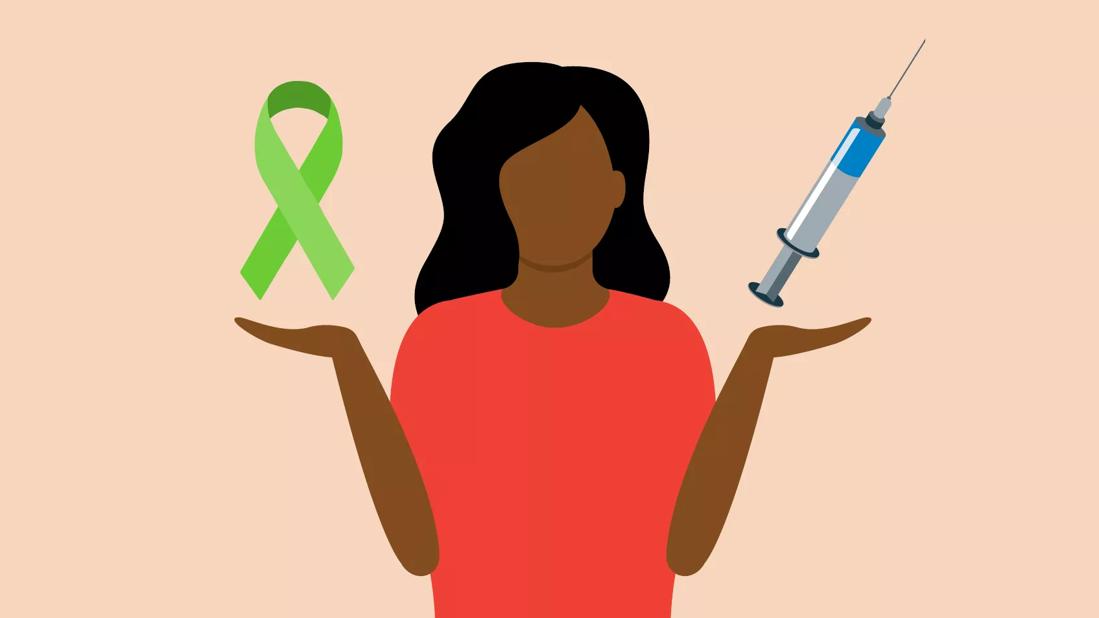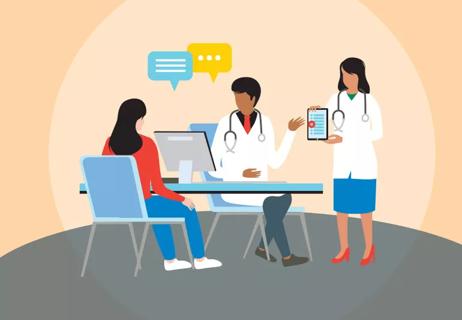Vaccination is a good idea before or after treatment

Maintaining your health and protecting your body from potential infection is important — and that’s where vaccines come into play. But if you have lymphoma and are concerned that your treatment could have adverse effects on your immune system, you may be worried about receiving certain vaccines while you’re in treatment.
Advertisement
Cleveland Clinic is a non-profit academic medical center. Advertising on our site helps support our mission. We do not endorse non-Cleveland Clinic products or services. Policy
Oncologist Robert Dean, MD, explains what vaccinations you can get if you have lymphoma and which ones you should avoid.
The quick answer is yes, if you have lymphoma, you should get your standard vaccinations as soon as possible.
Your immune system is made up of a gigantic network of cells that communicate with each other in order to build up its defenses and fight against incoming infections. When infectious agents like bacteria, viruses and parasites are introduced, your body works to build up immunity against them.
But certain types of cancer — especially blood cancers like follicular lymphoma, mantle cell lymphoma, non-Hodgkin lymphoma and diffuse large B-cell lymphoma — affect your immune system directly.
“Your immune system is a really big, coordinated network with millions of cells communicating with one another,” explains Dr. Dean. “If you take a bunch of malignant versions of those cells and plop them into that network, they can disrupt the normal interactions between immune cells that they depend on in order to do their jobs properly.”
The standard treatment combination of chemotherapy and immunotherapy drugs affects your immune system, too, by temporarily wiping out some healthy immune cells. When you’re going through these treatments, they can lower your immune system’s ability to create antibodies against new infections it hasn’t seen before.
Advertisement
For this reason, Dr. Dean recommends receiving your vaccinations before treatment to allow your body enough time to build up its defenses before temporarily losing that ability during treatment.
“It’s important to try to top off your immunity as much as possible before we get too far into treatment,” advises Dr. Dean. “It takes a long time for those reserve antibody-making cells to recover to normal levels again after people have finished their treatment.”
When it comes to vaccines, there are two main types to consider: live virus vaccines and non-live (or inactivated) virus vaccines. Non-live vaccines are made of parts of a virus that are no longer capable of reproducing. Live virus vaccines introduce a live virus to your immune system. Here’s how those vaccines work, and why you should avoid live virus vaccines if your immune system is being compromised:
Influenza vaccines are non-live or inactivated vaccines. Non-live vaccines don’t provide as much immunity as live virus vaccines. But they still do their job — and that’s incredibly important when you consider our immune systems are under attack during flu season every year. By getting your flu shot before starting lymphoma treatment, you can reduce your risk of getting sick during treatment.
Dr. Dean strongly recommends everyone get at least two doses of the COVID-19 vaccine before they begin treatment for lymphoma.
“The COVID vaccines are much more effective at protecting people with lymphoma from COVID if they get them before they’re treated,” says Dr. Dean. “If you give the COVID vaccines after treatment, it hamstrings the ability of your immune system to generate antibodies.”
This means your weakened immune system during treatment may not be strong enough to fight off a COVID-19 infection effectively. But if you can get the vaccine before beginning treatment, your body can build its immunity up to sustain protection while you’re in treatment.
A shingles vaccine is a subunit vaccine, which means it uses specific pieces of the germ to help your immune system target those same pieces in your body. The result is a stronger immune system response. Starting at 50, the U.S. Centers for Disease Control and Prevention (CDC) recommends getting two doses of the shingles vaccine two to six months apart. People with weakened immune systems over the age of 19 should also get the shingles vaccine. Like the influenza vaccine, if you need one, make sure you get it before starting your lymphoma treatment or after treatment has finished.
Advertisement
Live virus vaccines get your immune system to generate a robust response against infection by introducing a live virus to your immune system. When this happens, it produces a mild infection so your body can begin building antibodies against future attempts from that infection.
“Vaccines that work in this manner are some of the oldest vaccines that we have going back decades, and they can trigger very protective and long-lasting immunity without causing any serious illness in the vast majority of people who get them,” says Dr. Dean.
Some of these live virus vaccines include:
These weakened strains won’t make you sick if you have a healthy, functioning immune system, but they can cause illness if your immune system is weak, say, while you’re getting treatment for lymphoma or sick with another illness.
“Most guidelines recommend waiting up to six months after treatment before giving a live virus vaccine,” notes Dr. Dean.
Vaccines themselves don’t have negative effects on treatment for lymphoma. But the effectiveness of vaccines decreases by as much as 50% while you’re receiving treatment and for at least six months afterward, depending on how you measure it.
Advertisement
“It’s important for people to understand that we worry about whether the vaccines will be as effective as we want them to be, but we don’t have a reason for concern about the safety of the vaccines, with the exception of the live weakened strains of virus,” reassures Dr. Dean.
Vaccines made without live viruses can be given safely at any time, but you should hold off from getting live virus vaccines for at least three months after your treatment ends to avoid potential illness.
At the end of the day, vaccines produce the most protective effect when they’re given before lymphoma treatment is started or at least six months after treatment ends. If you have lymphoma and you’re considering a vaccine, you should speak with your doctor about which recommended vaccines are appropriate for you.
“I strongly recommend to my patients that they get vaccinated right away if they haven’t already,” states Dr. Dean. “The more immune protection people can carry into their treatment, the better off they’re going to be.”
Advertisement
Learn more about our editorial process.
Advertisement

It’s important to take time for yourself as you go through your cancer journey

A support system you trust and a care team you’re comfortable with can help you adjust

Certain foods like whole grains, eggs and nuts can boost your well-being during treatment

Listen to them, field questions from family and friends, and provide some normalcy

People with sickle cell trait have one copy of an abnormal gene — people with the disease have two

All states require DTaP, MMR, polio and chickenpox vaccines — healthcare providers recommend others, too

Rolling up your sleeve in September or October is ideal — but it’s never too late to get your flu shot

Both leukemia and lymphoma are blood cancers — but one is found in your bone marrow, while the other is found in your lymph nodes

Wearing a scarf, adjusting your outdoor activities and following your asthma treatment plan can help limit breathing problems

Your diet in the weeks, days and hours ahead of your race can power you to the finish line

When someone guilt trips you, they’re using emotionally manipulative behavior to try to get you to act a certain way